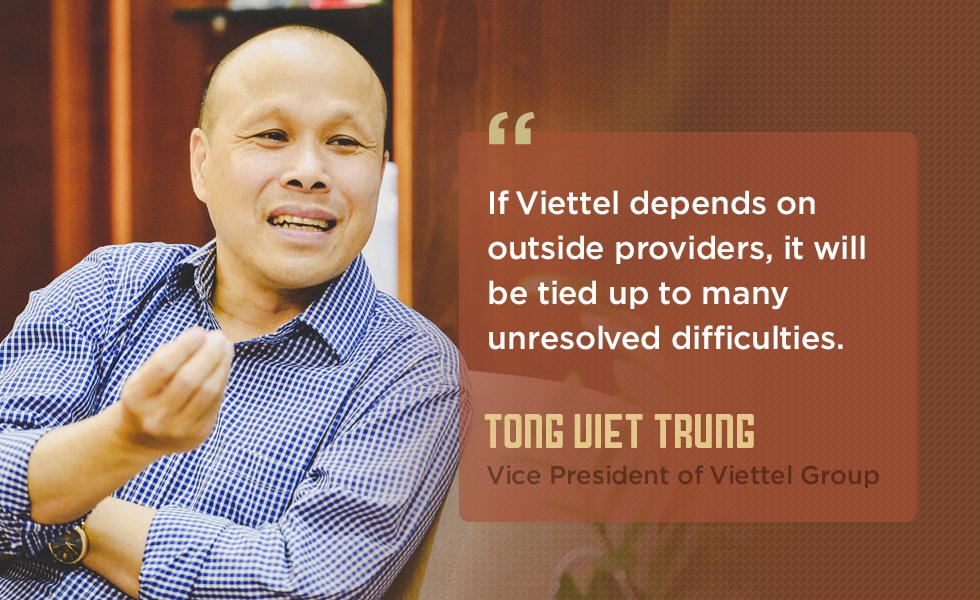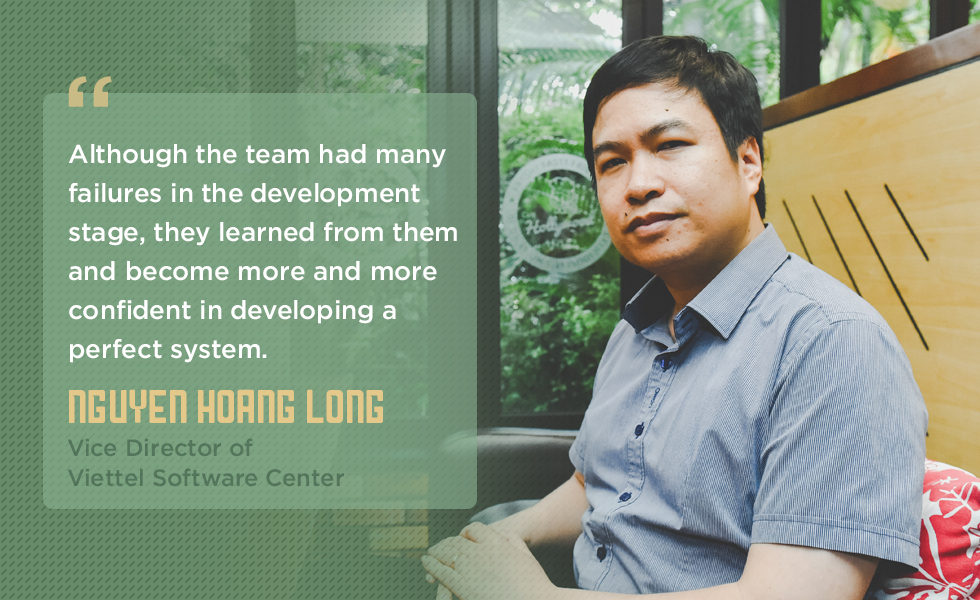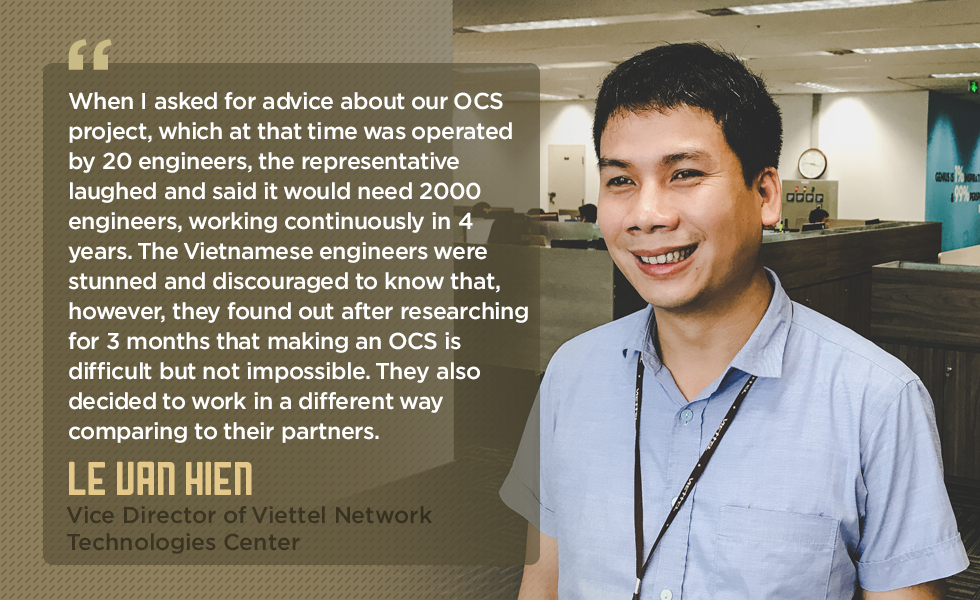Viettel celebrates real-time billing
A Vietnamese company has successfully developed a real-time billing system (OCS) for telecommunication networks for the first time.
Billing systems for telecommunication companies contain all the data about customers, product, services and business policies information. Amdocs, Ericsson, Huawei are only three network providers in the world right now selling billing systems.
Viettel used a billing system provided by another company for more than 7 years until 2011. However, with the extremely rapid growth of network usage in Vietnam, the system constantly needed to be upgraded and modified. Each modification would take months.
Viettel had to replace its billing system every three years and each time would take around a year to adapt the new one. The OCS systems bought from outside providers were difficult and slow to adapt to Viettel’s billing requirements and had many difficulties.
Therefore Viettel decided to make its own billing system.
Therefore, Vice President of Viettel Corp, Tong Viet Trung, decided to make its own billing system.
"If Viettel depends on outside providers, it will be tied up to many unresolved difficulties," Trung said. "Therefore, Viettel needed to create its own technology, despite the fact that the corporation would have to start from scratch."

When Viettel started operating in Vietnam, its customers are mostly low-income people who usually checked their balance after each call, meaning the system was constantly in use.
After a few years, Viettel successfully developed many new services with its partners, such as call and message blocking, local service calls and area billing system. These first successes proved that Viettel is able to create its own system.
However, Viettel employees were shocked when visiting a research and development department of a partner business. “I was a little overwhelmed when I visited their R&D centre. It was like a city,” said Nguyen Hoang Long, the first director of Viettel’s OCS project. “When I asked for advice about our project, which at that time was operated by 20 engineers, the representative laughed and said it would need 2,000 engineers, working continuously for four years”. But after three months the Viettel technicians thought constructing the OCS would be difficult but not impossible. They also decided to work in a different way comparing to their partners.

After beginning in 2011, after 2 years, OCS 1.0 was implemented in East Timor with a capacity of 1 million subscribers per site. A year later, Viettel introduced version 2.0 of its OCS, expanding the capacity to 8 million subscribers per site. Viettel’s OCS system director Nguyen Hoang Long said that although the team had many failures in the development stage, they learned from them and become more confident in developing a perfect system. He could not remember how many times they have failed, but the most important thing was to maintain the enthusiasm of the team.
Version 2.0 of Viettel’s OCS was rejected by its close partner in Cameroon. Furthermore, because there was no breakthrough in the technology, the OCS could not compete with other competitors.
In September 2015, Viettel started developing the next version of the OCS.
In April 2017, vOCS 3.0 was successfully introduced to the market and used to manage 90 million subscribers in Vietnam. The new OCS had a capacity of 24 million people per site, which is the biggest in the world and double the size of the second largest OCS billing system. According to Viettel’s Head of IT Division and Global Operations Centre Nguyen Van Hung, Viettel’s new OCS can filter spam messages 10 times faster than other systems, which helps reduce the workload of its engineers. In addition, it takes only four months to apply the new system, which is only a third of the amount of time as previously and there is little to none problems.
The new system has been successfully deployed in East Timor, Cameroon, Burundi, Tanzania, Peru and Vietnam with a total subscriber of 140 million, making Vietnam one of the top countries in billing system technology. The new system only needs three to five engineers to operate the system instead of 50 as previously. The new system saves Viettel around 70 million dollars a year. However, money is not the most important benefit.
Deputy Director of the OCS project Pham Tuan Anh said that the new real-time billing system helped Viettel become faster and more accurate in handling business inquiries, where data is one of the most important aspects of telecommunication.
The new system helps people who share a mobile account with their internet plan easily pay. In addition, the new system can calculate billing for different services on the same mobile sim. For example, it can differentiate between company account and personal account. In the future, there will be many new features provided to vOCS 3.0.
Viettel Corporation President Nguyen Manh Hung said that the most special thing about Viettel’s OCS system is its people who create the system. The Viettel CEO said, “When starting the telecom business, Viettel considered each customer as a separate entity that needed to be listened to and served separately.” After 17 years, this goal finally came true.
With vOCS 3.0, Viettel will have a new marketing and business plan that is different from thousands of other service providers in the world. It is the opportunity for Viettel to expand overseas.

As for the vOCS 3.0 production team, the next task is to successfully deploy the system in every country that Viettel is doing business with. More importantly, the product can be sold to other operators, helping people become more aware of Vietnamese technology,
Billing systems for telecommunication companies contain all the data about customers, product, services and business policies information. Amdocs, Ericsson, Huawei are only three network providers in the world right now selling billing systems.
Viettel used a billing system provided by another company for more than 7 years until 2011. However, with the extremely rapid growth of network usage in Vietnam, the system constantly needed to be upgraded and modified. Each modification would take months.
Viettel had to replace its billing system every three years and each time would take around a year to adapt the new one. The OCS systems bought from outside providers were difficult and slow to adapt to Viettel’s billing requirements and had many difficulties.
Therefore Viettel decided to make its own billing system.
Therefore, Vice President of Viettel Corp, Tong Viet Trung, decided to make its own billing system.
"If Viettel depends on outside providers, it will be tied up to many unresolved difficulties," Trung said. "Therefore, Viettel needed to create its own technology, despite the fact that the corporation would have to start from scratch."

When Viettel started operating in Vietnam, its customers are mostly low-income people who usually checked their balance after each call, meaning the system was constantly in use.
After a few years, Viettel successfully developed many new services with its partners, such as call and message blocking, local service calls and area billing system. These first successes proved that Viettel is able to create its own system.
However, Viettel employees were shocked when visiting a research and development department of a partner business. “I was a little overwhelmed when I visited their R&D centre. It was like a city,” said Nguyen Hoang Long, the first director of Viettel’s OCS project. “When I asked for advice about our project, which at that time was operated by 20 engineers, the representative laughed and said it would need 2,000 engineers, working continuously for four years”. But after three months the Viettel technicians thought constructing the OCS would be difficult but not impossible. They also decided to work in a different way comparing to their partners.

After beginning in 2011, after 2 years, OCS 1.0 was implemented in East Timor with a capacity of 1 million subscribers per site. A year later, Viettel introduced version 2.0 of its OCS, expanding the capacity to 8 million subscribers per site. Viettel’s OCS system director Nguyen Hoang Long said that although the team had many failures in the development stage, they learned from them and become more confident in developing a perfect system. He could not remember how many times they have failed, but the most important thing was to maintain the enthusiasm of the team.
Version 2.0 of Viettel’s OCS was rejected by its close partner in Cameroon. Furthermore, because there was no breakthrough in the technology, the OCS could not compete with other competitors.
In September 2015, Viettel started developing the next version of the OCS.
In April 2017, vOCS 3.0 was successfully introduced to the market and used to manage 90 million subscribers in Vietnam. The new OCS had a capacity of 24 million people per site, which is the biggest in the world and double the size of the second largest OCS billing system. According to Viettel’s Head of IT Division and Global Operations Centre Nguyen Van Hung, Viettel’s new OCS can filter spam messages 10 times faster than other systems, which helps reduce the workload of its engineers. In addition, it takes only four months to apply the new system, which is only a third of the amount of time as previously and there is little to none problems.
The new system has been successfully deployed in East Timor, Cameroon, Burundi, Tanzania, Peru and Vietnam with a total subscriber of 140 million, making Vietnam one of the top countries in billing system technology. The new system only needs three to five engineers to operate the system instead of 50 as previously. The new system saves Viettel around 70 million dollars a year. However, money is not the most important benefit.
Deputy Director of the OCS project Pham Tuan Anh said that the new real-time billing system helped Viettel become faster and more accurate in handling business inquiries, where data is one of the most important aspects of telecommunication.
The new system helps people who share a mobile account with their internet plan easily pay. In addition, the new system can calculate billing for different services on the same mobile sim. For example, it can differentiate between company account and personal account. In the future, there will be many new features provided to vOCS 3.0.
Viettel Corporation President Nguyen Manh Hung said that the most special thing about Viettel’s OCS system is its people who create the system. The Viettel CEO said, “When starting the telecom business, Viettel considered each customer as a separate entity that needed to be listened to and served separately.” After 17 years, this goal finally came true.
With vOCS 3.0, Viettel will have a new marketing and business plan that is different from thousands of other service providers in the world. It is the opportunity for Viettel to expand overseas.

As for the vOCS 3.0 production team, the next task is to successfully deploy the system in every country that Viettel is doing business with. More importantly, the product can be sold to other operators, helping people become more aware of Vietnamese technology,

Leave your comment on this story